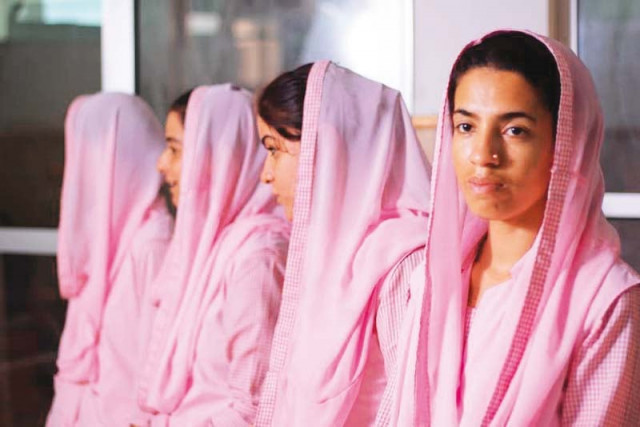The poor woman’s disease: Living in pain for 25 years, Sursan Bibi smiles again
For women with obstetric fistula, being shunned from society is not the only option

The midwives of Koohi Goth Hospital. PHOTO: COURTESY FAISAL SAYANI
The prospect of treatment only came up recently, when a flyer about fistula and its treatment reached her village. Travelling 400 kilometres from Harnai district, her eldest son Hazrat brought her to Quetta. While her surgery was successful, Sursan, now 65, regrets the years of her life that were wasted.
Known as 'the poor woman's disease', the obstetric fistula develops in prolonged labour when the mother cannot seek proper medical care or reach a trained midwife in time. "The baby's head may get stuck in the birth canal and if it keeps pushing against the thin wall between the birth canal and the bladder or rectum, it causes a tear," explains Dr Suboohi Mehdi, a surgeon at Karachi's Koohi Goth Hospital, Pakistan's most well-known hospital for the treatment of fistula. The result is urine or stool incontinence. For such women, who leak waste continually and are ostracised from society, normal life becomes a distant dream.

Sursan, married too early, gave birth to five children at home with the help of a dai (traditional birth attendant). In her village, the women are allowed to leave their homes only to visit relatives or take cattle for grazing; they are not allowed to seek medical help without being accompanied by their male relatives.
A day after her third child was born, she started to leak urine. The smell was unbearable. The dai told her husband that it would get better in a few days but days turned into decades, during which she bore two more children. Unlike most women suffering from this condition, Sursan's husband didn't abandon her.
Parts of Balochistan, like most underprivileged parts of Pakistan, have a high incidence of fistula. United Nations Population Fund (UNFPA) provincial coordinator Ahsan Tabasum, talking to The Express Tribune in Quetta, says that the UNFPA and Pakistan National Forum for Women Health (PNFWH) are working together to eradicate this disease from Balochistan.
"We have centres for fistula treatment in three hospitals in Quetta, where the patients are treated free of charge," he discloses. Around 515 patients have received treatment here since 2006, with a success rate of over 90 per cent, while the UNFPA has helped over 5,000 women in Pakistan with surgical treatment for the disease through its seven regional centres in the country.
A lot of women travel all the way from all provinces to Karachi to get treatment at Koohi Goth Hospital. Surgeons here are trying to salvage 33-years-old Gulzada Zaman’s bladder. But for Gulzada, it may already be too late. “If only a skilled midwife would have told her in time that her next delivery should be surgically done, this girl’s life could have been saved,” laments Noor Gul, a midwife who has been serving at Koohi Goth since nine years. “The lack of awareness, and how easily the disease can be avoided, is very frustrating. Doctors cannot always reach far flung areas, so the key is having trained midwives in every part of Pakistan,” she says.
Noor and her colleagues have to not only bathe and clean the patients who arrive after strenuous journeys, but also have to psychologically counsel them and make them believe that they are not “unclean”. Complicated cases require more than one surgery, and treatment and rehabilitation can take months.
Another kind of fistula, fast increasing in number, is the iatrogenic fistula which develops when an unskilled surgeon performs a surgery poorly due to malpractice and lack of training.
UNFPA has supported more than 5000 women to receive surgical treatment for fistula in Pakistan through their seven regional centres in the country. The campaign involves three key strategies - prevention, treatment and social reintegration of survivors. Yet, more needs to be done. According to Tariq Nisar, Media Coordinator for PNFWH, “an estimated 3000 to 5000 year new cases develop each year in Pakistan.” Women like Sursan who suffer from obstetric fistula are usually among the hardest to reach, and are often illiterate and with limited access maternal and reproductive health care. With gender and socio-economic inequality, lack of schooling, child marriage and early child bearing already holding back Pakistan’s underprivileged women, patients smelling due to the fistula suffer from further marginalization. Even when cured, the psychological impacts remain, and many are abandoned by families too.
Meanwhile, Sursan Bibi's smile has returned. "I will not advise any woman in my village to go to the dai," she vows. "Instead, I will urge them to visit the gynaecologist."
Published in The Express Tribune, May 23rd, 2015.



















COMMENTS
Comments are moderated and generally will be posted if they are on-topic and not abusive.
For more information, please see our Comments FAQ